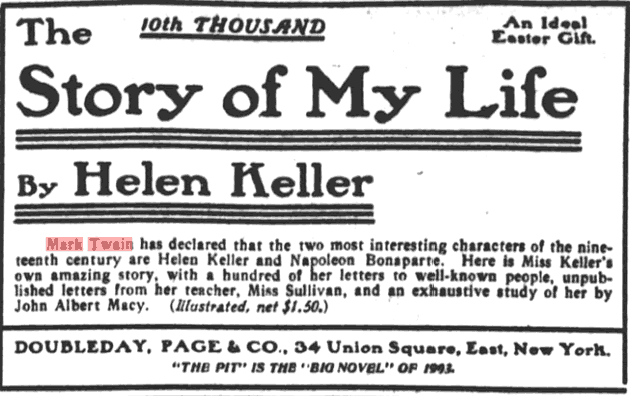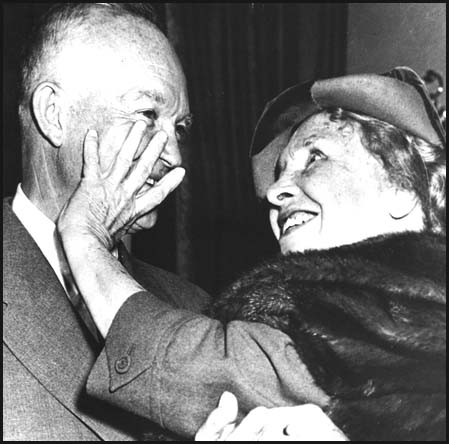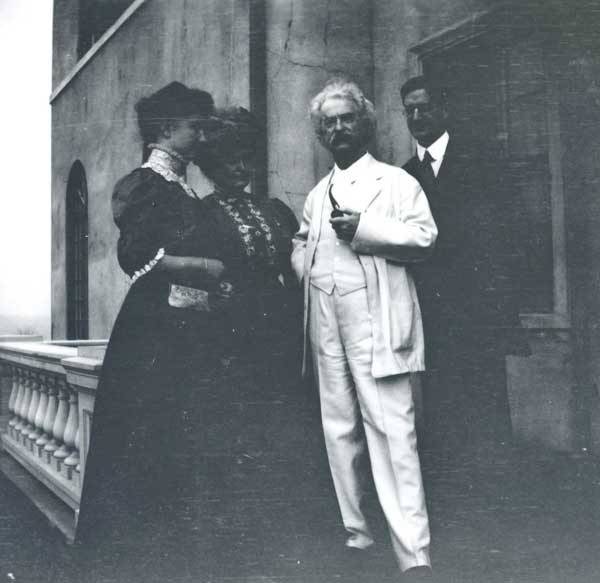|
>
Curated by Brent M. Colley, Heather Morgan and Lisa
Burghardt
"He entered into my limited world with enthusiasm
just as he might have explored Mars. Blindness was
an adventure that kindled his curiosity. He treated
me not as a freak, but as a handicapped woman seeking
a way to circumvent extraordinary difficulties. There
was something of divine apprehension in this rare
naturalness towards those who differ from others in
external circumstances."
-Helen Keller on meeting Mark Twain
They first met in March
1895 at a luncheon held in Keller’s honor at West 34th
Street in NYC. It was the home of Laurence Hutton, an
editor and critic who was Twain’s friend and one of
Helen’s early benefactors.
Henry Rogers was there
with Twain and about a dozen others to welcome & wish
Helen well during her stay in NYC where she had come
to study speech at the School for the Deaf.
During the luncheon
the two spent time together and Helen seemed to feel
more at ease with Twain than with any of the other guests.
Hutton later said: “He was peculiarly tender and
lovely with her-even for Mr. Clemens- and she kissed
him when he said good-bye.”
Helen had read some
of his work and asked him to explain the origin of his
pseudonym “Mark Twain”. After explaining its meaning
to steamboat pilots he added that the name suited him
because he “was sometimes light and on the surface,
and sometimes-” “Deep,”
she interrupted, surprising him with her quickness and
intelligence.
“His voice is truly wonderful,”
she later recalled. “To my touch, it was deep &
resonant…he spoke so deliberately that I could get
almost every word with my fingers on his lips.”
“Mark Twain has his own way
of thinking, saying and doing everything. I can feel
the twinkle of his eye in his handshake. Even while
he utters his cynical wisdom in an indescribably droll
voice, he makes you feel that his heart is a tender
Iliad of human sympathy.”
At the conclusion of this luncheon, Helen shook the
hands of all the guest and thanked them by name as they
left. For whatever reason, Twain decided to quickly
pat her on the head as he passed by, and to his astonishment…she
knew who did it!
He later said: “Perhaps someone else can explain
this miracle, but I have never been able to do it. Could
she feel the wrinkles in my hand through her hair?”
He found out how when she visited him at Redding in
1909: “I smelled you” was her honest reply (Twain
smoked 10-20 cigars a day).
Following this meeting, Twain was so impressed by Helen
that he wrote to the wife of Henry H. Rogers asking/pleading
her to convince her husband to support Keller’s education.
[Twain himself was bankrupt at this time and relying
on Rogers to correct his own financial situation.]
“For & in behalf of Helen Keller,
Mr. Rogers will remember our visit with that astonishing
girl at Lawrence Hutton’s house when she was 14 years
old. Last July, in Boston, when she was 16 she underwent
the Harvard examination for admission to Radcliffe
College. She passed without a single condition. She
was allowed only the same amount of time that is granted
to other applicants, & this was shortened in her case
by the fact that the question-papers had to be read
to her. Yet she scored an average of 90, as against
an average of 78 on the part of the other applicants.
It won’t do for America to allow this marvelous child
to retire from her studies because of poverty. If
she can go on with them she will make a fame that
will endure in history for centuries. Along her special
lines she is the most extraordinary product of all
the ages. I beg you to lay siege to your husband &
get him to interest himself and Messrs. John D. &
William Rockefeller & the other Standard Oil chiefs
in Helen’s case…[to] pile that Standard Oil Helen
Keller College Fund as high as they please; they have
my consent.”
The result of this letter was that Mr. Rogers personally
took charge of Helen Keller’s fortunes, and out of his
own means made it possible for her to continue her education
and to achieve for herself the enduring fame which Mark
Twain had foreseen.
Twain's Reaction to this News:
“It is superb! And I am beyond measure grateful
to you both. I knew you would be interested in that
wonderful girl, & that Mr. Rogers was already interested
in her & touched by her; & I was sure that if nobody
else helped her you two would; but you have gone far
& away beyond the sum I expected—may your lines fall
in pleasant places here, & Hereafter for it!
Ever sincerely yours,
S. L. CLEMENS.”
From that day forward Twain and Keller would maintain
a special friendship. Publically, Twain would promote
and raise awareness of her works and efforts in his
books, speeches and articles. Privately, they would
exchange letters, meet up with one another and offer
up support when it was needed.
"I think "Mark Twain" is a very appropriate
nom de plume for Mr. Clemens because it has a funny
and quaint sound that goes well with his amusing writings,
and its nautical significance suggests the deep and
beautiful things he has written."
- Helen Keller, letter March 29, 1895
********************************************************************
"Helen Keller has been dumb, stone deaf,
and stone blind, ever since she was a little baby
a year-and-a-half old; and now at sixteen years of
age this miraculous creature, this wonder of all the
ages, passes the Harvard University examination in
Latin, German, French history, belles lettres, and
such things, and does it brilliantly, too, not in
a commonplace fashion. She doesn't know merely things,
she is splendidly familiar with the meanings of them.
When she writes an essay on a Shakespearean character,
her English is fine and strong, her grasp of the subject
is the grasp of one who knows, and her page is electric
with light. Has Miss Sullivan taught her by the methods
of India and the American public school? No, oh, no;
for then she would be deafter and dumber and blinder
than she was before. It is a pity that we can't educate
all the children in the asylums."
-Mark Twain, Following the Equator (1897)
********************************************************************
"Riverdale - on - the Hudson
St. Patrick's Day, 1903
Dear Helen:
I must steal half a moment
from my work to say how glad I am to have your book
and how highly I value it, both for its own sake and
as a remembrance of an affectionate friendship which
has subsisted between us for nine years without a
break and without a single act of violence that I
can call to mind. I suppose there is nothing like
it in heaven; and not likely to be, until we get there
and show off. I often think of it with longing, and
how they'll say, "there they come--sit down in front."
I am practicing with a tin halo. You do the same.
I was at Henry Roger's last night, and of course we
talked of you. He is not at all well--you will not
like to hear that; but like you and me, he is just
as lovely as ever.
Every lovingly your friend (sic)
Mark"
********************************************************************

********************************************************************

"...Do try to reach through grief and feel
the pressure of her hand, as I reach through darkness
and feel the smile on my friends' lips and the light
in their eyes though mine are closed."
-Consoling letter from Keller to Twain following
the death of his wife in 1904.
********************************************************************

Helen Keller, Anne Sullivan Macy, Mark Twain, John
Macy at Stormfield (Redding, Connecticut)
Helen Keller visited Twain for three
days in January of 1909. She was 28 years old and had
recently released her second major work: “The World
I Live In”
The copy Twain received
was inscribed:
“Dear Mr. Clemens, come live
in my world a little while. -Helen Keller.”
In response, he had
said that she must come to his world first, and to bring
Annie (Sullivan) Macy & John Macy with her.
“I command you all three,
to come and spend a few days with he in Stormfield.”
Of all the visitors
to Stormfield none wrote a more vivid description of
the place than Helen Keller.
Nothing escaped her
senses, from the “tang in the air of cedar and pine”
as she made her approach to the smell of “burning
fireplace logs, orange tea and toast with strawberry
jam” which were served shortly after her arrival.
That which she could
not see was “spelled” into her hands by her teacher,
Annie Sullivan Macy, a.k.a. “The Miracle Worker” as
Twain called her.
It was not generally
known that Keller had a great sense of humor, but it
was one of the things Twain liked best about her.
When he showed her
to her room on the first night at Stormfield, he told
her that if she needed anything, she would find an ample
supply of cigars and bourbon in the bathroom.
When he gave her a
tour of the billiards room, he offered to teach her
the game. She took the bait and innocently replied,
“Oh Mr. Clemens, it takes sight to play billiards.”
Not the way his friends played, he answered. “The
blind couldn’t play worse.”
The highlight of Helen’s
visit came on the final evening when Twain read to her
his short story: Eve’s Diary.
He sat in a big armchair
by the fire while Helen followed the story with an ecstatic
expression on her face. At the very last line: “Wherever
she was, there was Eden.” (Twain’s tribute to his
wife Livy) Helen became tearful.
In her journal, Twain’s
secretary wrote:
“She quivered with delight,
and he was shaken with emotion & could hardly find
his voice again. It was a marvel to behold.”
In the Guestbook of
Stormfield she wrote:
“I have been in Eden three
days and I saw a King. I knew he was a King the minute
I touched him though I had never touched a King before.”
- A Daughter of Eve. Helen Keller
Jan. 11
Twain understood her
meaning so completely that he wrote beside it:
“The point of what Helen says
above, lies in this: that I read the ‘Diary of Eve’
all through, to her last night; in it Eve frequently
mentions things she saw for the first time but instantly
knew what they were & named them- though she had never
seen them before.”
In Keller’s ‘The
Story of My Life’, she recalls the joy of learning
the names of things after she acquired the gift of language:
“…the more I handled things and learned their names
and uses, the more joyous & confident grew my sense
of kinship with the rest of the World.”
Keller had recognized
that Twain used this in his story and it overjoyed them
both.
As a way of thanking
Annie Sullivan Macy for helping to bring Helen’s imagination
to life, Twain handed her a small souvenir before she
left Stormfield.
It was a *postcard
on which he wrote:
“To Mrs. John Sullivan Macy
with warm regard & with limitless admiration of the
wonders she has performed as a **miracle-worker.”
*This postcard is on loan from the American
Foundation for the Blind and will be displayed at Easton
Public Library from May 19 to June 30, 2012
**It would take 50
years for the term “miracle-worker” to catch on; but
it did- via the Broadway show about Annie by playwright
William Gibson.
Helen's visit to Stormfield would be the
last time the two would meet in person but Keller did
return to Stormfield after his death in 1910. Of that
visit she wrote:
"I have visited Stormfield since Mark Twain's
death. The flowers still bloom; the breezes still
whisper and sough in the cedars, which have grown
statelier year by year; the birds still sing, they
tell me. But for me the place is bereft of its lover."
This exhibit has been made
possible by donations to the History
of Redding website and the generous
assistance of Helen Selsdon, archivist at the American
Foundation of the Blind in New York City.
Donations
to AFB can be made online.
|